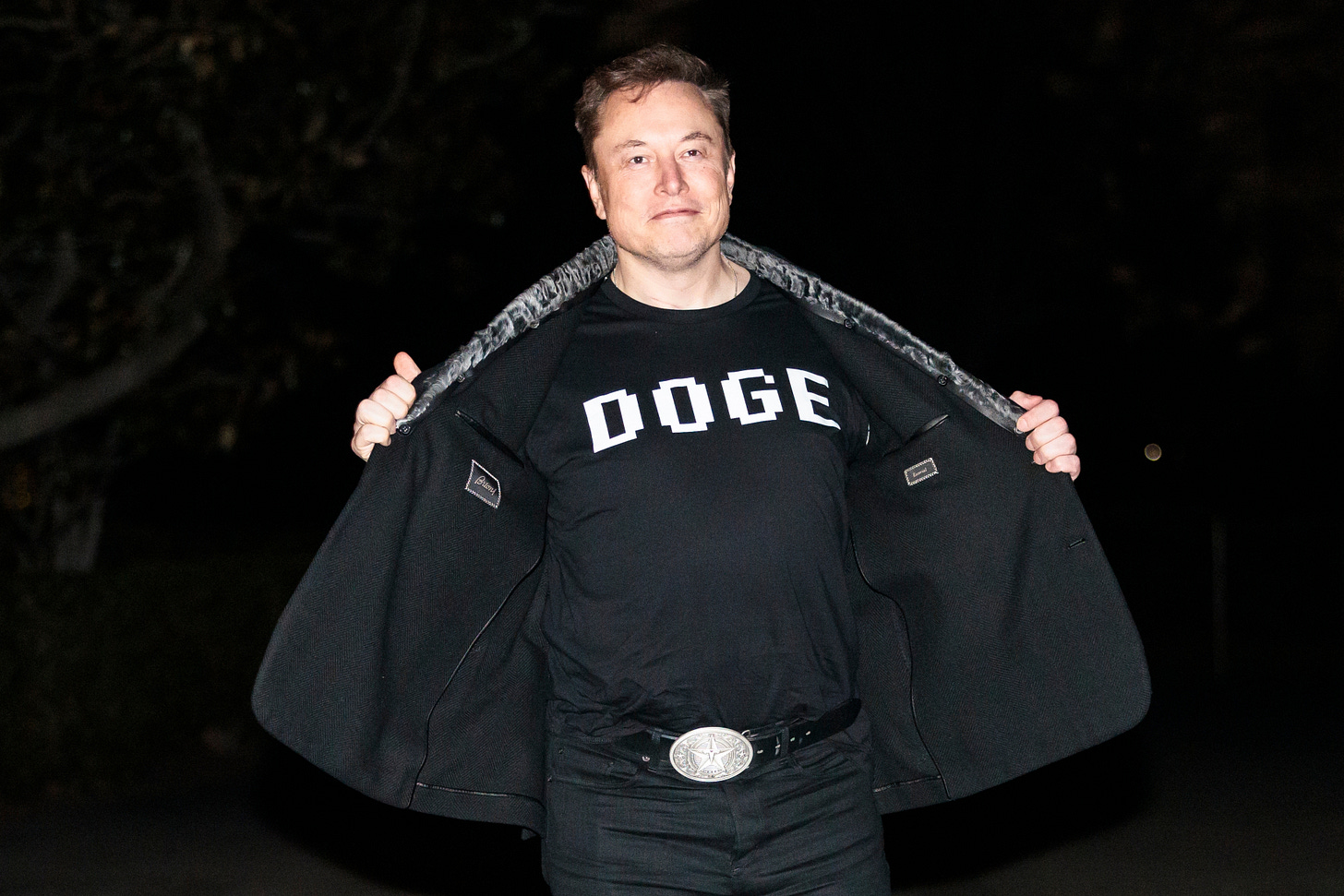Elon Musk Discovers What Hierarchy Actually Means
The neo-reactionary dream meets the law of the strong.
Elon Musk is having a very bad week. The man who bought Twitter for $44 billion to secure unaccountable power over public discourse is discovering what unaccountable power actually looks like when wielded by someone who understands dominance better than he does.
Trump just stripped SpaceX of a government contract and handed it to Jeff Bezos. Musk’s response? Rage-tweeting at Trump officials, including the immortal question “why are you gay”—the rhetorical sophistication we’ve come to expect from the richest man-child on the planet having a public meltdown because Daddy won’t give him what he wants.
This isn’t just delicious schadenfreude, though it is that. This is the neo-reactionary project—the Silicon Valley movement to restore hierarchy and reject democratic constraints—consuming its architects in real-time. A perfect demonstration that the oligarchs funding authoritarian politics fundamentally misunderstood what they were building.
They thought they were buying hierarchy with themselves at the top. They’re discovering that authoritarian hierarchy doesn’t work that way. It requires constant demonstration of dominance through arbitrary humiliation of subordinates. There are no stable positions. No guaranteed seats at the table. No amount of money that exempts you from being the example.
Musk thought he’d bought partnership. He bought the privilege of being degraded publicly.
This is what Peter Thiel and Curtis Yarvin and the entire Silicon Valley neo-reactionary apparatus never quite explained to their fellow travelers: In the systems they’re building, someone has to be subordinate. The hierarchy they’re restoring doesn’t stop conveniently at their own necks. And Trump—whatever else he is—understands this instinctively. He knows that power in authoritarian systems isn’t demonstrated through competent governance or policy achievement. It’s demonstrated through the arbitrary exercise of dominance over those who thought themselves powerful.
Musk genuinely believed his wealth made him Trump’s equal. That his “genius” and his billions and his control of critical infrastructure (Twitter, SpaceX, Starlink) secured him a permanent seat at the table. He thought he was Roy Cohn but permanent. He thought “First Buddy” meant something.
He’s learning what Roy Cohn learned: You’re useful until you’re not. And when you’re not, the humiliation is public, arbitrary, and designed to demonstrate to everyone else what happens when you forget your place.
The contract going to Bezos isn’t about SpaceX’s technical capabilities or cost-effectiveness or any rational criterion. That’s the point. It’s about Trump demonstrating he can take from Musk and give to his rival for no reason except to show he can. And Musk—for all his billions, for all his companies, for all his supposed genius—can do exactly nothing except tweet impotently while the adults laugh at him.
This is the system they built. This is what they wanted—rule by the strong, unencumbered by democratic constraints, where power flows from dominance rather than from consent. They just thought they’d be the ones doing the dominating.
Here’s what makes it particularly delicious: Musk can’t even exit. All that crypto-libertarian fantasy about “exit” and seasteading and network states—it was always cope. You can’t exit power when the person wielding it controls access to the government contracts your companies depend on, the regulatory environment your businesses operate in, and the geopolitical decisions that determine whether your satellites stay in orbit.
Thiel’s dictum that “competition is for losers” works when you’re the monopolist. But Trump is the ultimate monopolist—of attention, of dominance, of the willingness to humiliate anyone anywhere for any reason. There’s no competing with that. Only submitting or being destroyed.
And Musk will submit. He’ll apologize. He’ll grovel. He’ll delete the tweets and post something obsequious about how President Trump is making brilliant decisions for America. Because the alternative is watching everything he’s built get systematically dismantled by someone who understands that in authoritarian systems, the point isn’t good governance—it’s demonstrating who’s subordinate.
The man who bought Twitter because he wanted absolute control is learning what absolute control actually means when someone else has it. The irony would be poetic if it weren’t so terrifying. Because this isn’t just about Musk’s bruised ego. This is about oligarchs discovering that the authoritarian systems they funded don’t stop at the people they don’t like. Hierarchy has teeth. And those teeth point in every direction.
Ask yourself: in the system you’re part of, are you ever really at the top—or always potentially the subordinate? The architects of neo-feudalism are learning the answer the hard way.
This is what authoritarian dominance looks like—cultivated by the powerful, weaponized by the dominant, and turned back on its architects.
Welcome to the world you built, Elon. How’s it feel?





Wait the guy who can't stay bribed didn't stay bribed. What a shock
You're useful until you're not indeed!